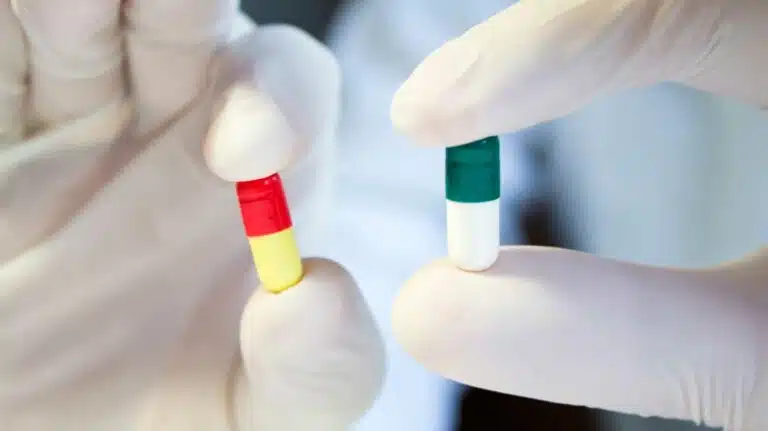Mixing MDMA & SSRIs | Effects & Dangers

MDMA, also known as ecstasy and molly, has a long history as an illicit party drug frequently used at concerts, festivals, raves, and urban nightlife.
In recent years, however, MDMA-assisted therapy has gathered increasing attention as a promising treatment option for psychotherapy, and for addressing treatment-resistant post-traumatic stress disorder (PTSD) in particular.
Antidepressants, on the other hand, describe a diverse class of drugs used as mood enhancers and prescribed to treat various forms of clinical depression, including major depressive disorder.
While there are a variety of different antidepressant types available, the most common variety used today are selective serotonin reuptake inhibitors (SSRIS), including:
- fluoxetine (Prozac)
- citalopram (Cipramil)
- paroxetine (Seroxat)
- sertraline (Lustral)
- citalopram (Celexa)
- sertraline (Zoloft)
- paroxetine (Paxil)
Effects Of Mixing SSRIs And MDMA
Both MDMA and SSRIs work by increasing serotonin (5-HT) activity in the central nervous system, but there are significant differences between the two and their specific mechanisms:
- SSRIs block serotonin reuptake, slowing down the recycling of the neurotransmitter in the synapses and increasing the concentration of serotonin active in the central nervous system
- MDMA acts on the same receptors, dramatically blocking serotonin reuptake in the same way while also directly stimulating increased serotonin levels along with dopamine, norepinephrine, and other brain and neurotransmitter systems
The shared effect on reuptake between the two drugs is noteworthy, as a person who is on an SSRI antidepressant and takes MDMA will find that the two drugs compete for the same receptors.
This competition reduces the overall effects of MDMA, preventing or delaying a person from getting high.
Reduced Stimulant & Psychedelic Effects
Typically, MDMA causes a wide range of mindset-related stimulant and psychedelic effects including:
- increased feelings of well-being
- extroversion
- emotional warmth
- empathy
- increased sensory perception
- impaired motion perception
- detachment from oneself (depersonalization)
- illogical or disorganized thoughts
- panic attacks
However, when taken in combination with an SSRI, a person will tend to get less high, get high more slowly, or not get high at all, even if larger doses of MDMA than normal are taken.
Comedown & Reduced SSRI Effectiveness
Because serotonin is still being expended, there is a high likelihood that the negative comedown effects associated with MDMA use may still occur in the following days, which may include:
- depression
- anxiety
- fatigue
- irritability
- aggression
- impaired attention and memory
- nightmares
There is also a strong possibility that the aftereffects of MDMA may interfere with the effectiveness of SSRI antidepressants for a period of time, leading to a period of unusually severe or disturbing depressive symptoms.
Dangers Of Mixing MDMA & SSRIs
MDMA is an illicit street drug and is frequently counterfeited or adulterated with a wide variety of other substances, ranging from harmless or toxic filler compounds to other drugs of abuse like LSD, ketamine, methamphetamine, MDA, and fentanyl.
These unexpected and sometimes dangerous substances may also interact with antidepressants and your overall mental health and mindset in unpredictable and potentially dangerous ways.
Physical Effects
Along with its potent psychological effects, high doses of MDMA are also known for causing physical side effects that may include:
- increases in body temperature (hyperthermia) and blood pressure (hypertension)
- faintness
- jaw clenching
- reduced appetite
- hot flashes and chills
- sweating
- muscle or joint stiffness
- seizures
Taking MDMA with an SSRI may reduce the severity of these physical side effects as well, but not eliminate them.
More specifically, the combination doesn’t tend to increase heart rate and blood pressure in the same way that MDMA does on its own, but it does trigger an even longer lasting and potentially hazardous increase in body temperature.
MDMA-related hyperthermia can be fatal, as high internal body temperature and dehydration can cause brain swelling, muscle breakdown, kidney failure, and cardiovascular failure without prompt treatment.
Risk Of Serotonin Syndrome
Serotonin syndrome is a dangerous drug interaction that can occur when antidepressants or other serotonergic substances are used with MDMA. This includes SSRIs, SNRIs, and especially monoamine oxidase inhibitors (MAOIs).
Serotonin syndrome is essentially a form of serotonin overdose, and is known to cause a wide variety of symptoms, including:
- restlessness
- insomnia
- confusion
- elevated blood pressure, heart rate, and body temperature
- dilated pupils
- loss of muscle coordination
- twitching
- muscle rigidity
- heavy sweating
- diarrhea
- headache
- shivering
- goosebumps
In the most serious cases, serotonin syndrome can become life-threatening, generating severe signs and symptoms which include high fever, tremors, seizures, irregular heartbeat, and loss of consciousness.
If you or a loved one struggle with MDMA or prescription drug abuse, please contact us today to learn how we can help.
Written by Ark Behavioral Health Editorial Team
©2024 Ark National Holdings, LLC. | All Rights Reserved.
This page does not provide medical advice.
Frontiers in Psychiatry - Reported Cases of Serotonin Syndrome in MDMA Users in FAERS Database
International Journal of Adolescent Medicine and Health - Ecstasy use and serotonin syndrome: a neglected danger to adolescents and young adults prescribed selective serotonin reuptake inhibitors
National Institute on Drug Abuse (NIDA) - What are the effects of MDMA?
Vice - Everything You Need to Know About Mixing MDMA and Antidepressants
Questions About Treatment?
Ark Behavioral Health offers 100% confidential substance abuse assessment and treatment placement tailored to your individual needs. Achieve long-term recovery.
100% confidential. We respect your privacy.
Prefer Texting?
Our friendly support team is here to chat 24/7. Opt out any time.







 Learn More
Learn More








